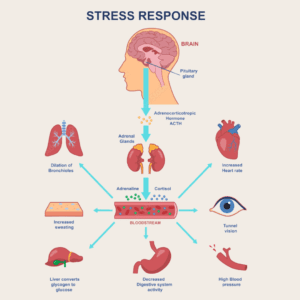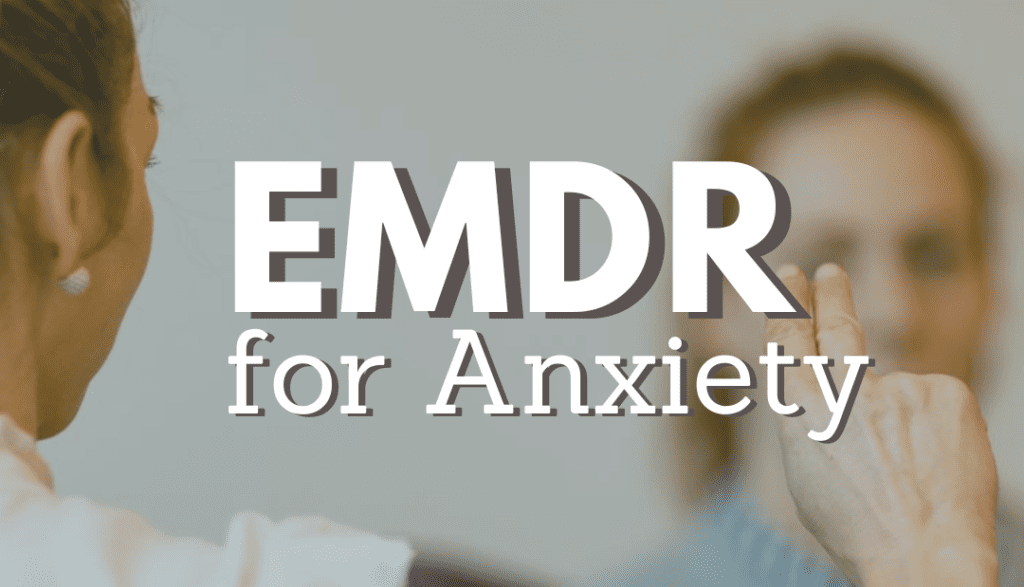Everybody feels anxious. It is a normal part of being human. Anxiety is the body’s way of raising defense against perceived threat or stress. The brain prepares your body with cues from the amygdala, the stress response center. Unfortunately, anxiety can get out of hand, interfering with daily living, relationships, and the quality of life. Chronic, debilitating anxiety can morph into severe mood disorders without any professional psychological intervention.
Eye movement desensitization and reprocessing (EMDR) therapy is an effective treatment for chronic anxiety. Although much of the research lauds it for its efficiency in treating trauma-related disorders, the intervention also alleviates anxiety successfully. How exactly does EMDR reduce anxiety symptoms and severity? Before answering this question, you need to understand how anxiety works.
What is Anxiety?
 Anxiety is simply worry, fear, or dread that develops when you feel threatened, stressed, or in danger. It manifests when the amygdala picks up stress sensations from your external and internal environment, processes them, and activates the stress response, also known as the fight or flight mechanism or just anxiety.
Anxiety is simply worry, fear, or dread that develops when you feel threatened, stressed, or in danger. It manifests when the amygdala picks up stress sensations from your external and internal environment, processes them, and activates the stress response, also known as the fight or flight mechanism or just anxiety.
The amygdala sends stress signals to the hypothalamus, which activates the sympathetic nervous system responsible for involuntary body functions like breathing, blood circulation, and heartbeat. The signal constricts your blood vessels to increase blood flow, which, in turn, raises blood pressure. It also signals your adrenal glands in the kidney to release adrenaline, a primary stress hormone.
The distressing event gets stored in the hippocampus as a memory. Every time you encounter the same distress, the amygdala sounds the alarm and prepares your body for fight or flight.
The Stress Hormones
 Adrenaline increases your heartbeat rate tenfold to push blood to your vital organs – the heart, brain, and muscles. It also augments your breathing to boost oxygen intake. The body uses oxygen to burn glucose and produce energy.
Adrenaline increases your heartbeat rate tenfold to push blood to your vital organs – the heart, brain, and muscles. It also augments your breathing to boost oxygen intake. The body uses oxygen to burn glucose and produce energy.
Adrenaline works in tandem with cortisol, another primary stress hormone, whose action is in regulating glucose. Cortisol stimulates the body to burn stored glucose to release energy for fight or flight. It also redirects blood away from organs not involved in the stress response, like your immune and digestive systems. It is the reason you feel nauseous or the sudden urge to diarrhea as your body tries to eliminate any food from your system to keep it dormant.
All these physiological changes heighten energy production and delivery to the brain for enhanced alertness, the muscles for quick reflex movements and superhuman-like strength, and the heart for elevated cardiovascular function. It is the reason you can maneuver oncoming traffic in a flash, catch a falling baby, or remove your hand from a flame in a split second. The state is informally known as the adrenaline rush.
The Problem with Anxiety
While the stress response is essential for survival, it is harmful when continuously activated. Overexposure to stress overstimulates the amygdala, making it hypersensitive and hypervigilant to stress-related stimuli, resulting in persistent, uncontrollable, irrational, and intense anxiety, worry, and fear. Anxiety disorders develop because of recurring, sustained stress responses.
Debilitating anxiety also causes severe muscle cramps and aches from rapid and frequent muscle contraction and relaxation. It increases susceptibility to gastrointestinal issues like hyperacidity, enhanced or suppressed appetite, and irritable bowel syndrome (IBS). Additionally, severe anxiety impacts the heart and circulation, increasing vulnerability to cardiovascular illnesses like high blood pressure and heart palpitations.
How EMDR Correlates To Anxiety Disorders
EMDR operates on the Adaptive Information Processing (AIP) model principles. The model shows that the brain inadequately processes traumatic memories, creating isolated memory networks that cannot integrate fully when you are traumatized. The memories manifest as intrusive thoughts, vivid visions, and distressing flashbacks and nightmares. They also trigger intense emotions of dread and despair.
Trauma begins in the amygdala and follows a similar physiological pathway to anxiety. Furthermore, trauma and anxiety co-occur. A stressful event can become traumatic, while trauma triggers severe anxiety. On the one hand, the amygdala activates the stress response while stimulating the hippocampus to retrieve the fragmented memories associated with the current distress. On the other hand, intrusive memories, thoughts, and feelings of the stressful event trigger severe anxiety. The correlation makes EMDR effective in treating both anxiety and trauma conditions.
How EMDR Works
 EMDR therapy uses bilateral stimulation, a rhythm created through left and right movements. It could be through eye movements, where your therapist moves their finger from left to right methodically. Your counseling psychologist can also use audio stimulation by alternating sounds between your left and right ear. It can also be tactile, where your therapist gently taps alternatingly on your hands. During bilateral stimulation, the patient focuses on a distressing memory, thought, or feeling. The two simple techniques desensitize your brain, enabling it to reprocess the fragmented memory, thought, or feeling and integrate it into an adaptive memory network, reducing its emotional impact.
EMDR therapy uses bilateral stimulation, a rhythm created through left and right movements. It could be through eye movements, where your therapist moves their finger from left to right methodically. Your counseling psychologist can also use audio stimulation by alternating sounds between your left and right ear. It can also be tactile, where your therapist gently taps alternatingly on your hands. During bilateral stimulation, the patient focuses on a distressing memory, thought, or feeling. The two simple techniques desensitize your brain, enabling it to reprocess the fragmented memory, thought, or feeling and integrate it into an adaptive memory network, reducing its emotional impact.
Benefits Of EMDR Therapy In Treating Anxiety
Calms The Amygdala
EMDR desensitization calms the amygdala, enabling it to regulate stress effectively. Anxiety disorder makes the amygdala oversensitive to stress, making it respond to phantom stress simulations. The therapy reverses this hypersensitivity.
Reduces The Severity of Anxiety Symptoms
By decreasing the amygdala’s hypersensitivity and reprocessing your memory, EMDR
- Stimulates the inhibition of stress hormones, lowering your blood pressure, breathing and heart rate, and muscle irregularities
- Eliminates feelings of nausea and diarrhea in response to stress
- Increases your understanding of the entire stressful experience – from the initial stressor to your body’s reaction, reducing its hold on your emotions
Enhances Cognitive Processing
EMDR enables the hippocampus to integrate the stressful memory with associated information and experiences, leading to a more neutral understanding of the event.
Improved Emotional Regulation
With the stressful memory less emotionally charged, you become better equipped to manage future situations that trigger similar feelings.


EMDR Therapy Duration
Counseling takes 6 to 12 sessions once or twice every week. Each session focuses on a different stressful event or aspect. Many people experience relief before completing all the sessions.
Start Your EMDR Sessions Today
Do not let anxiety take hold of your life. Call us today to find relief from this debilitating mood disorder.
Contact Us
